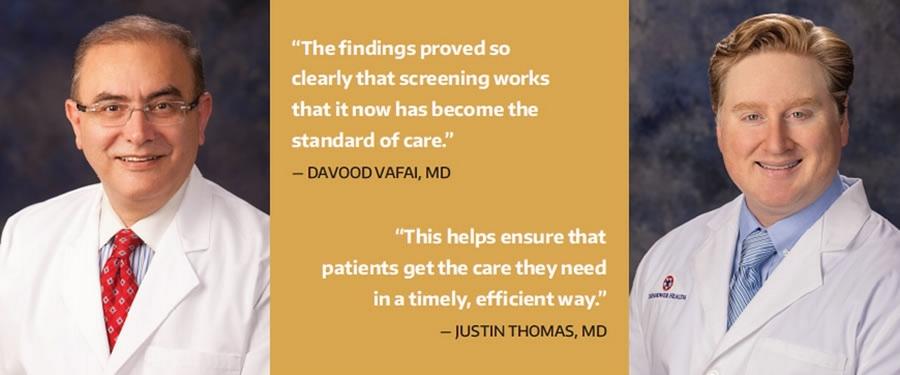



If you are or were a smoker, however, the key is to be screened for lung cancer early, before symptoms appear. That’s why Eisenhower Health has launched a comprehensive lung cancer screening and lung nodule clinic.
“This new clinic not only provides state-of-the-art lung cancer screening using low-dose CT, but also streamlined access to appropriate treatment when indicated,” explains Justin Thomas, MD, who spearheaded this initiative. Dr. Thomas is Board Certified in Pulmonary Disease, Interventional Pulmonary Medicine, Internal Medicine and Critical Care Medicine.
“Our nurse practitioner, Amanda Moyer, NP, manages the clinic and expedites scheduling and care coordination,” he continues.
“And we hold twice-monthly meetings with a multidisciplinary team that includes oncology, thoracic surgery, radiology, radiation therapy and other specialists who work together to determine the best approach for diagnosing and treating each patient in whom screening detects a suspicious lung nodule.”
Advanced technology boosts efficiency
Dr. Thomas notes that the clinic also has invested in two advanced systems that help make screening, diagnosis, treatment and patient management even more efficient.
“One is a computer-aided detection system that not only detects lung nodules on CT scans but also measures their volume, compares them to previous scans and calculates their volume doubling time,” he explains. Benign nodules grow slowly, if at all, while cancerous nodules can double in volume every four months or less.
The second system tags key words in reports dictated by the radiologists who read the CT scans, automatically alerting Moyer that specific patients require follow-up and generating a report for discussion at the multidisciplinary team meetings.
“This helps to ensure that patients get the care they need in a timely, efficient way,” Dr. Thomas says, noting that the clinic follows up with patients within a week of their scan with a plan for moving forward.
Lung cancer screening covered by insurance
Dr. Thomas also emphasizes that lung cancer screening is covered by insurance — Medicare, MediCal and private insurance — when patients meet the screening criteria.
“What’s more, you don’t need a physician referral to be screened,” he adds. “Simply call the clinic and we’ll go over the screening questions to see if you qualify.”
He also urges primary care physicians to refer appropriate patients for screening.
“Our clinic can take a lot of work off their hands while keeping them informed of their patient’s status,” Dr. Thomas says.
A remarkable increase in survival
Eisenhower has been on the leading edge of lung cancer screening since 2002 when Board Certified Medical Oncologist Davood Vafai, MD, brought the landmark I-ELCAP (International Early Lung Cancer Action Program) clinical trial to the Medical Center.
“In this study, national and international institutions pooled data collected under a screening protocol that called for a baseline low-dose CT scan and a follow-up annual scan thereafter,” Dr. Vafai explains. “The Findings proved so clearly that screening works that it now has become the standard of care.”
These Findings, based on nearly 32,000 people screened worldwide, showed that annual CT screening enables at least 80 percent of lung cancers to be diagnosed at Stage I. “If you detect this disease when the nodule is one centimeter or less and do surgery within one month, the 10-year survival rate is 90 percent,” Dr. Vafai says. “That’s remarkable, considering that in the 1980s, most lung cancers were detected in late stages of the disease and as such, the five-year survival rate was just 12 to 15 percent.
“We have a comprehensive screening program in place at Eisenhower to detect lung cancer early,” he adds. “We just need more people to take advantage of it.”
No judgment
“In California, only one percent of eligible patients are getting screened for lung cancer, making us one of the worst states in the nation,” Dr. Thomas says. “The average screening rate across the entire country is just four percent,” he notes.
Why such a low rate when this test can literally save people’s lives?
“Part of it is lack of awareness about just how effective screening can be, and part is the stigma about smoking, even among some physicians,” Dr. Vafai says.
“Some smokers fear they’ll face judgment if they ask about screening,” Dr. Thomas says, adding, “That won’t happen at our clinic.”
“Or someone doesn’t have any symptoms, so they think they’re okay,” he continues. “But the problem with lung cancer is that if you wait for symptoms to appear, it’s generally too late — nationally, only about 23 percent of lung cancer is caught in the early stage. So if you’re a screening candidate, please call us,” he adds.
Who should be screened for lung cancer?
The U.S. Preventive Services Task Force recommends annual screening for lung cancer with low-dose computed tomography (LDCT) if you’re:
Experts in Detection and Treatment
At Eisenhower Health, a multidisciplinary team of experts works cooperatively in the detection and treatment of lung cancer. In addition to low dose CT screening to find lung cancer early, Eisenhower specialists use advanced technologies to biopsy nodules to determine the type and stage of lung cancer and whether it has spread to nearby lymph nodes. Cases are presented at a multidisciplinary tumor board attended by oncologists, thoracic surgeons and pulmonology specialists, among others, to determine the appropriate diagnostic and treatment plan for each patient, from robotic bronchoscopy to immunotherapy and robotic surgery. This full complement of detection, diagnosis and treatment makes Eisenhower Health a leader in lung cancer care.
To determine if you’re a candidate for lung cancer screening, call Eisenhower’s Lung Cancer Screening Program at 760-837-8880.